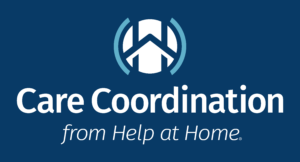Help at Home Launches In-home Care Coordination Business Segment
Connecting home care to health care to transform the delivery of personal care services

Care Coordination for Help at Home.
(CHICAGO, Illinois, Oct. 19, 2022) Help at Home, the largest national provider of in-home, person-centered care for seniors, today announced the creation of its new Care Coordination business segment. Care Coordination from Help at Home will focus on transforming the delivery of in-home personal care services, increasing access to care, improving quality and cost outcomes and increasing client satisfaction and health equity for aging-in-place seniors, the underserved and chronic care populations.
The creation of its new Care Coordination business segment and addition of two key leadership positions enables the company to focus on transformational programs and services to deliver a more integrated and holistic care coordination model. As the largest provider of in-home, personal care services, Help at Home is uniquely positioned to be the connecter of home care to health care to help seniors and disabled populations live healthy lives as safely and independently as possible in their homes.
Help at Home’s new President of Care Coordination Julie McCarter brings more than 25 years of health care leadership experience. Help at Home’s new Chief Clinical Officer Marianne Longo joins the company with 30+ years of leadership and clinical practice expertise.
McCarter, responsible for the development and leadership of the company’s new Care Coordination business segment, will focus on the creation of innovative, in-home personal care coordination experiences for its Medicaid, Medicare and dual-eligible client populations across the country.
“We have a unique industry vantage point with observational capabilities from our 50,000 compassionate caregivers and more than 65 million hours spent with clients each year. We can gather insights from caregivers who spend approximately 20 hours a week and have four-year relationships on average with their clients,” said McCarter. “We know our clients, and we have line of sight into physical, behavioral and environmental changes which provide us with the abililty to predict and prevent problems, triggering interventions, as well as closing gaps in care.”
The company launched its first-generation in-home, personal care coordination program in 2021. Called HealthyMatch, the program has shown success in connecting home care to health care. The Care Coordination approach starts with connecting the caregiver observations to a clinical team, a network of providers and community resources to create a more holistic model of care. HealthyMatch is increasing client satisfaction and improving quality, care and cost outcomes by addressing unmet medical, behavioral and social needs, especially with complex chronic care populations.
“We’re excited to partner with health care providers and payers to offer a value proposition that improves in-home care delivery, helping clients age in place in their homes,” said Help at Home’s President of Home Care Tim O’Rourke. “Dual-eligible clients commonly face multiple chronic conditions, comorbidities and a higher index of Social Determinants of Health, making them a complex population to manage. Care coordination programs lay the foundation and play a vital role in managing chronic populations, closing gaps in care. That sets the stage for value-based care arrangements layered into the programs as the next step toward managing care and cost outcomes.”
In-home personal care is increasingly recognized as a vital service within the dual-eligible market and with Medicare Advantage plans that have expanded benefits. Payer and health system partnerships can contribute to paving the way for this type of integrated care coordination so dual-eligible populations can have access to in-home personal care coordination services with the goal of improving cost and quality outcomes.
“In-home personal caregivers have the inside knowledge from observations and client relationships that provide vital care coordination insights,” said Longo. “Caregivers see the nuances in physical and behavioral changes that just are so important in providing the appropriate treatment at the appropriate time, which is what our care coordination strategy is built upon.”
According to Help at Home caregiver Arlona, having the support of care coordination offers her access to a multidisciplinary team to help her provide better care for her clients.
“Through this program, I have access to social workers, nurses, community health workers – it takes a village, and we have a village to help me provide the very best care I can for my clients,” said Arlona.
About Help at Home
Help at Home is the largest national provider of in-home personal care services, delivering high-quality, relationship-based care to help seniors and individuals living with disabilities remain independent in their homes, the preferred setting of care. During the second quarter of 2022, Help at Home, with more than 190 branch locations across 12 states, provided in-home, community-based services to more than 66,000 clients monthly with the help of 49,000 highly trained caregivers. For more information about Help at Home, visit www.helpathome.com. For more information about Care Coordination from Help at Home, visit www.helpathome.com/care-coordination.